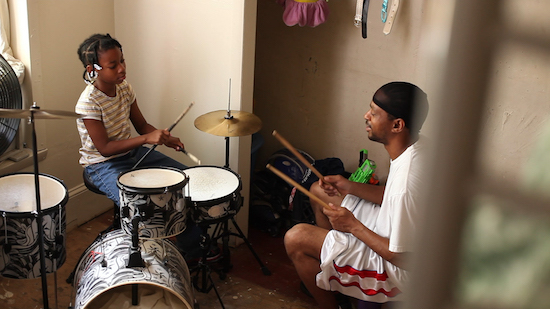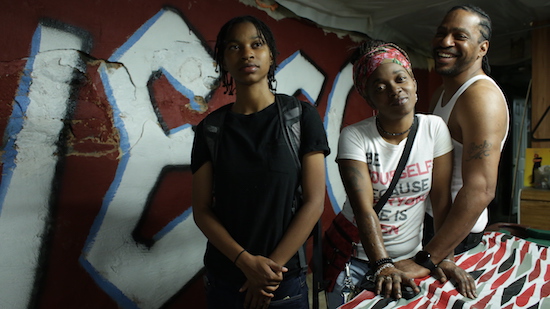Quest: A Family Endures
Around a decade ago, Jonathan Olshefski began taking photographs of a basement music studio in North Philadelphia, a hangout for local hip hop artists. The planned photo essay would reflect working life vs. creative life, specifically that of music promoter/producer Christopher “Quest” Rainey, owner of the studio. But Olshefski got so caught up in Rainey’s life and that of his family, that he wound up switching to film and shooting for almost a decade.
The result is Quest, an intimate documentary about a working-class African-American family struggling — and ultimately coping — with crime, poverty and illness. For those who aren’t familiar with rough neighborhoods like North Philly, the film also offers a glimpse into an impoverished but tight-knit community that is both frustrated and hopeful about its prospects. Neither glibly upbeat nor utterly despairing, the film achieves a believable balance that seems to reflect the current situation of so many Americans.
Quest, which opens with the 2008 presidential election as backdrop and closes with Trump soundbites from the 2016 debates, includes various events as time markers, including Obama’s second win in 2012. Though Quest, who exhorts his community to vote, is clearly thrilled with those victories and is suspicious of Trump’s promises to African-Americans, it becomes pretty obvious that the national political scene doesn’t really have much of an effect on the day-to-day realities of his neighborhood.
At the beginning of the film, we see preparations for Quest’s marriage to Christine’a (“Ma Quest”), after 15 years together. We meet their young daughter PJ, an aspiring DJ, and William, Christine’a’s son from an earlier relationship. The father of a brand-new baby boy, William has just been diagnosed with a malignant brain tumor and must undergo treatment, with the support of Christine’a and Quest. She already has a challenging job in a women’s homeless shelter, while Quest delivers neighborhood circulars in addition to doing various household chores and walking his daughter to the school bus daily. He also hosts gatherings at his studio for passionate young hip hop artists, as much to keep them out of trouble as to give them an outlet for their aspirations. We watch him interact with one of his main artists, Price, as the latter is clearly still struggling with alcohol addiction despite his protests to the contrary. Quest is clearly frustrated – he had high hopes for the rapper, which included his own success – but continues to work with him.
From what we see in the film, the Raineys have an easy rapport with each other and with their community, for whom they are pillars—Christopher with his studio; and Christine’a, who is a kind of den mother (as she wearily testifies), hence the nickname “Ma.” Though William’s diagnosis is a hard one, the couple and PJ provide solid assistance, including care for his infant son. William himself is understandably less sanguine, at one point expressing frustration with chemo’s side effects and his inability to find a good job because of his condition. We watch the Raineys toil at their respective jobs, with Christopher finding release in the studio, where mentoring young locals feels like concrete action.
When despite their best efforts, violence befalls the family, it’s a real test of their mettle. Due to their stature in the neighborhood, they have the support of many, including local cops, which helps them get through it. Ultimately, the Raineys, along with the community, find cause to celebrate.
As an engaging portrait of a typically atypical American family and their environment, Quest is that most successful of nonfiction films: a specific window into others’ lives and a cogent representation of a bigger picture.
Quest opens on Friday, Dec. 8, at the Quad Cinema, NYC.
—Marina Zogbi




